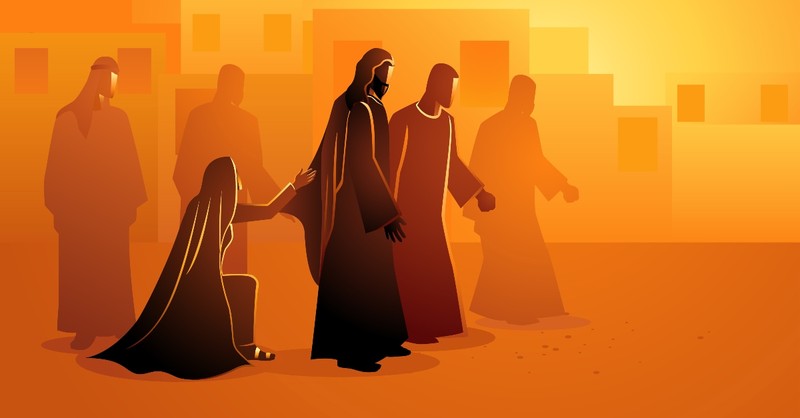
Do you struggle with feelings of inadequacy? Thinking you’re not enough for your spouse, children, church, friends—not enough for God? Do you feel too weak or ill-qualified? I’ve experienced those feelings. I often ask myself, “Who am I to write for God?” I’m aware of my weaknesses and unworthiness. I’m not better than others and sometimes feel less than. When someone responds to an article saying it helped or encouraged them, I know it’s because of God’s grace. Mother Teresa once said, “I’m a little pencil in the hand of a writing God, who is sending a love letter to the world.” That’s how I feel. I know I fall short as a writer, wife, or mother, and this pains me.
But I take comfort in knowing I’m not alone in my feelings of insecurity. Many characters in the Bible felt this way. Here are six men and women from Scripture who feared they weren’t enough:
Photo Credit: © Unsplash

1. The One Who Was too Afraid
God’s people, the Israelites, were slaves in Egypt for centuries and cried out to Him for help. God answered their prayers through Moses, who had fled Egypt to the wilderness. While tending his sheep, he witnessed an amazing phenomenon—a burning bush not being consumed. When he came closer God spoke to him saying, “I have indeed seen the misery of my people in Egypt. I have heard them crying out because of their slave drivers, and I am concerned about their suffering. So I have come to rescue them...So now, go. I am sending you to Pharaoh to bring my people the Israelites out of Egypt.” (Exodus 3:7-10)
Moses argued with God, revealing his insecurity:
- “Who am I that I should go?” he asked. God responded, “I will be with you and promise to bring you to worship on this mountain.” (Exodus 3:11-12)
- “What if they do not believe me or listen to me?” God demonstrated he would use miracles and signs to show proof. (Exodus 4:1-9)
- “I have never been eloquent...I am slow of speech and tongue.” God responded, “Who gave human beings their mouths?... Is it not I, the LORD? Now go; I will help you and teach you what to say.” (Exodus 4:10-12)
Moses ended with, “Please send someone else” (Exodus 4:13). He still wouldn’t believe he was enough for this assignment. Although angry, God showed Moses grace by sending his brother, Aaron, to speak for him. Moses obeyed and God did great and wondrous works through him and delivered His people from slavery in Egypt.
Moses, who felt totally inadequate, eventually led his people to freedom doing miracles along the way. This biblical account demonstrates how God’s calling in our lives does not depend on our abilities but our obedience. God equips the one who obeys Him.

2. The One Who Felt too Weak
The Israelites were suffering under the oppression of the Midianites. God sent an angel to Gideon, who was threshing wheat in secret so the enemy couldn’t steal it. Scripture tells us, “When the angel appeared to Gideon, he said, ‘The Lord is with you, mighty warrior.’” Gideon responded, “If the LORD is with us, why has all this happened to us?...The LORD has abandoned us” (Judges 6:11-13).
The angel persisted saying, “Go in the strength you have and save Israel out of Midian’s hand. Am I not sending you?” (Judges 6:14)
Gideon replied, “’How can I save Israel? My clan is the weakest in Manasseh, and I am the least in my family’ The LORD answered, ‘I will be with you, and you will strike down all the Midianites, leaving none alive’” (Judges 6:15-16).
Gideon felt too weak for this task. Twice he asked God to give him a sign proving His power and He graciously answered. Gideon then obeyed and delivered his people (Judges 6 and 7).
While initially fearful, Gideon became a mighty warrior who rescued God’s people. This account reminds us that God understands our doubts and fears. He uses our weaknesses to lead us to depend on Him, and then through our weaknesses, we experience His strength.
Photo Credit: © Getty Images/Massonstock

3. The One Who Felt too Young
God said to the prophet Jeremiah, “Before I formed you in the womb I knew you, before you were born I set you apart; I appointed you as a prophet to the nations.”
Jeremiah answered, “Alas, Sovereign LORD...I do not know how to speak; I am too young” (Jeremiah 1:5-6).
Jeremiah felt inadequate to be a prophet. He believed in God but doubted He could use him. The LORD encouraged him saying, “Do not say, ‘I am too young.’ You must go to everyone I send you to and say whatever I command you. Do not be afraid of them, for I am with you and will rescue you” (Jeremiah 1:7-8). God then touched Jeremiah’s mouth and told him He would give him whatever words he needed.
For forty years, Jeremiah served God and warned His people of an upcoming Babylonian attack and captivity.
Jeremiah who doubted his abilities, served as one of God’s greatest prophets. His story teaches us though we may fear failure, when we move forward in faith, God works through us to fulfill His purpose.
Photo Credit: © Pexels/Ethan Jones

4. The One Who Felt Unworthy
A Centurion, an officer in the Roman army, sent word to Jesus asking Him to come and heal his terminally-ill servant. The Jewish elders he sent spoke highly of him and how he had helped the Jewish people. When Jesus headed to his house, the man sent word again, “Lord, don’t trouble yourself, for I do not deserve to have you come under my roof. That is why I did not even consider myself worthy to come to you. But say the word, and my servant will be healed” (Luke 7:6-7).
Amazed at this Roman’s faith, an enemy of Jews and their religion, Jesus said: “I tell you, I have not found such great faith even in Israel” (Luke 7:9). The servant was healed at that moment.
The Centurion believed Jesus had the power to heal. He recognized His divine authority but felt undeserving to have Him come to his house. Yet, Jesus answered his prayer and healed the man’s servant.
In reality, the Centurion was correct in his self-evaluation. No one deserves to come to Jesus. We’re all sinners. Yet, He loves us and offers grace to anyone who believes in Him. He wants us to come to Him. He wants you.
The Centurion felt unworthy, but Jesus praised him for his faith.
Photo Credit: © Unsplash/Aaron Burden

5. The One Who Felt Untouchable
Many people came to Jesus asking for healing. But one woman, it seems, felt unworthy to come to Him face to face. She suffered with a hemorrhage which had lasted for twelve years. Jewish law called her unclean as written in Leviticus 15:25, “When a woman has a discharge of blood for many days...that continues beyond her period, she will be unclean as long as she has the discharge.” Twelve years untouchable!
This rejected woman moved through the crowd thinking, “If I only touch His cloak, I will be healed” (Matthew 9:21). She found healing without breaking the law or drawing attention to herself (Mark 5:29). But, Jesus felt power leave Him and asked, “Who touched me?” Scripture records, “Then the woman, seeing she could not go unnoticed, came trembling and fell at His feet. In the presence of all the people, she explained why she touched Him and told of her instant healing. Then He said to her, ‘Daughter, your faith has healed you. Go in peace’” (Luke 8:43-48).
Called unclean by society, the woman’s behavior suggests she felt unacceptable to come to Jesus openly. Yet, He not only healed her, He brought her into the open and called the one previously labeled outcast, “Daughter.”
If you’re struggling with feelings of rejection and inadequacy, listen to Wholly Loved’s Faith Over Fear Podcast episode titled Fighting Fear of Rejection.
Photo Credit: © Getty Images/rudall30

6. The One Who Felt Rejected
would meet this woman there, he waited alone until she arrived around noontime. Women would usually come together in the cool of the morning but, she came alone in the heat of the day.
Normally, a Jewish man would not speak to a woman in public much less a hated Samaritan. But Jesus surprised her by engaging her in conversation.
He offered her living water, an invitation to believe in Him. Then He said, “Go and call your husband and come back.”
“’I have no husband’ she replied. Jesus said to her, ‘You are right when you say you have no husband. The fact is you have had five husbands, and the man you now have is not your husband.’” (John 4:16-18)
Some scholars suggest Jesus revealed the reason she came alone. Her past may have caused the other women to shun her. If so, she would have come alone to avoid their judgment and rejection. Whatever was true about her life, she likely had experienced deep pain and feelings of unworthiness.
After further discussion, Jesus then revealed His identity. When she mentioned waiting for the Messiah, He declared, “I, the one speaking to you—I am He” (John 4:26).
The woman believed Jesus and ran to tell everyone in town about the Messiah (John 4:29).
The woman, presumably isolated because of her past, told everyone about Jesus. As this woman learned, Jesus’s love for us frees us to share that love with others.
Each of these Bible characters learned an important lesson: We are all inadequate by ourselves, but God welcomes and loves us exactly as we are. When we are weak, He reveals His strength through us (2 Corinthians 12:10). Our limitations don’t limit God. In Him, we are complete. He says to us, “My grace is sufficient for you, for My power is made perfect in weakness” (2 Corinthians 12:9).
Insisting we should be strong by ourselves is the true weakness. When we lean on our own strength, we turn from depending on God and then we fail. James wrote, “But He gives us more grace. That is why Scripture says: ‘God opposes the proud but shows favor to the humble’” (James 4:6).
The strongest person admits her weaknesses. The greatest is the one who walks in humility. When we acknowledge we can do nothing apart from God and trust Him to work in us, then we walk in victory. We must turn our eyes from ourselves altogether and focus on the One who’s the source of all good things. Then we give Him all the glory.
God received the glory for the great acts of Moses and Gideon. He was the One who spoke through Jeremiah. He healed the bleeding woman and the Centurion’s servant. He transformed the Samaritan woman. He showed His glory through each one and they found their strength and identity in Him. We can also when we trust in Him.
Photo Credit: © Getty Images/inigofotografia
Originally published Tuesday, 23 February 2021.









